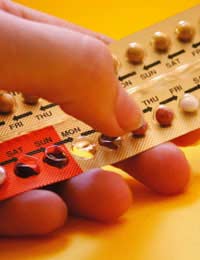Birth Control Methods and Fertility

Millions of women use various methods of birth control while maintaining an active, healthy sex life. The phase of unwanted pregnancy is usually temporary until the time a couple is ready to become parents. When choosing a specific birth control method, the effect it has on future fertility is a major concern for women.
Numerous methods of contraception exist, from barrier methods to hormonal. Barrier methods include condoms, diaphragms, Intrauterine devices and surgery, where as hormonal methods, include, birth control pills, hormonal patches and for those desiring prolonged infertility, hormonal implants. Despite all the variety, it is important to realise some forms of contraception can have an impact on fertility, directly or indirectly. Some forms of birth control may even lead to infertility that may be permanent.
Barrier Methods
Most barrier methods have minimal effect on future fertility, in most cases, cessation of the method leads to an immediate return of fertility potential. Barrier methods such as condoms and diaphragms offer this advantage.Not all barrier methods however afford this luxury; women who opt for intra uterine device implantation, (IUD) place themselves at an increased risk of developing pelvic inflammatory disease (PID). This disease can lead to infection, inflammation and scarring of the fallopian tubes. PID is also a potential risk for causing infertility. Scarring of the fallopian tubes leads to closure of the tubes lumen which can block the sperm from uniting with the ova (egg). Although IUD doesn’t directly lead to infertility, it can potentially cause it due to the increased association with PID.
Other barrier methods which can lead to infertility include surgical interventions such as vasectomy and tubal ligation. Vasectomy is a surgical procedure where the male reproductive outflow tract (vas deferens) is severed and the lose ends tied. Tubal ligation is a similar procedure on the woman’s fallopian tubes. Although options for reversal are available, they may not be successful. This form of birth control offers the greatest risk of permanent infertility.
Hormonal Methods
Hormonal options of birth control may also lead to a period of infertility, after cessation. This is however temporary until the menstrual cycle returns to normal. The time interval from cessation to fertility return depends on the hormonal method used, for example with hormonal implantation, like Norplant, the menstrual cycle may take up to 6 months to return to normal. For women taking birth control pills, the cycle usually return to normal within two to three months. The variance can be attributed to the hormonal concentrations of the specific pill used; some pills with higher oestrogen concentration can lead to a more prolonged interval. For women on the birth control patch the time interval is usually much shorter, but for obese women the cycle may take longer to return to normal because oestrogen is easily absorbed by adipose tissue (fat cells). These cells then become a reservoir for oestrogen release even after the patch has been removed.Numerous methods for birth control exist; deciding on the right one is a personal choice that takes into account cost, comfort, convenience, level of protection and return to fertility. In exploring your options it is best to discuss your personal needs with your doctor.
- Fertility Treatment and the Chances of Twins
- Egg Donation: Can Anyone Do It?
- What is the World Egg Bank?
- Why Does Women's Fertility Decline With Age?
- Freezing Sperm Fast: Why Does it Make a Difference?
- Herbs, Acupuncture and Fertility
- Fifty Years of Evidence Say the Pill is Safe
- Can Tubal Ligation Be Reversed?
- Hazards in the Workplace and Fertility
- Vasectomy Reversal
- Prescription Medications And Infertility
- Everyday Toxins And Infertility
- Erectile Dysfunction
- Your Diet and Fertility
- Do Fertility Drugs Affect Pregnancy Tests?
- Can Smoking Affect Fertility?
- Can Alcohol Affect Fertility?
- Does the Pill Affect Fertility?


Re: Ovary Transplants: Are They Possible?
Hi! I 37 years old single mather. I was ovary gonadoblastoma in 2013. Removed both ovaryes . I take hormon pills but…
Re: Ovary Transplants: Are They Possible?
I am a 54 year old women who went through an early menopause. Since then I have developed all sorts of issues which I…
Re: Ovary Transplants: Are They Possible?
I have pcos with it cure it if I have this done
Re: Ovary Transplants: Are They Possible?
We are from India and my wife got pregnant through IVF treatment, now she is in her 17th week of pregnancy. We have…
Re: Ovary Transplants: Are They Possible?
Janaka - Your Question:Hi everyone,My wife 28 years old, her both ovaries removed due to cyst after that she is facing…
Re: Ovary Transplants: Are They Possible?
Hi everyone, My wife 28 years old, her both ovaries removed due to cyst after that she is facing lot's lot's of…
Re: What Causes Sperm Loss?
I'm seeing only watered with little amount of white colour when it come out from my anus .wt is ur suggestions for this . please send reply.
Re: Ovary Transplants: Are They Possible?
I'm 38 years old , and I'm on HRT tablets because I have high hormones levels (FSH, LH) post menopausal, can I do…
Re: What Causes Sperm Loss?
Hi I am 23 year old , I had 5 wet dreams in within 9 days. This cenerio making me tense. Is this a problem ? The gap is not more then…
Re: What Causes Sperm Loss?
What can I use to generate loss of sleeps at the age of 60?